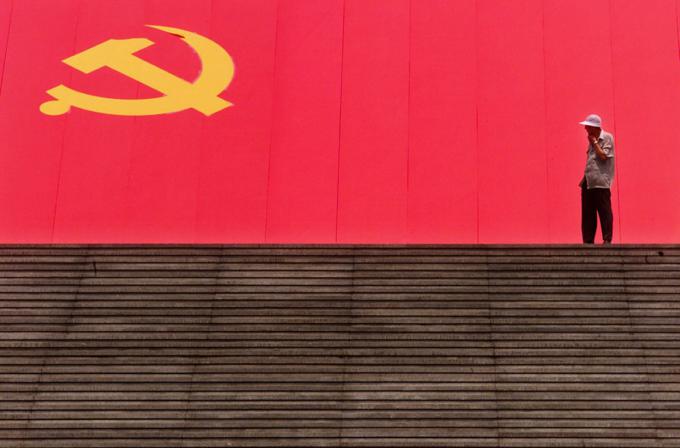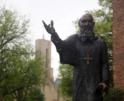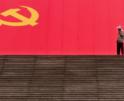
Faith
The CCP, however, adamantly opposes genuine Sinicization, seeking its own destructive version infused with atheistic ideology.
Each generation must fight the battle anew. After watching the Berlin Wall fall in 1989, it seemed like Communism was on its heels. Today, it continues to spread and has become more assertive through China's economic growth. The Chinese Communist Party (CCP) knows how resistance began in Catholic Poland under the moral leadership of Pope St. John Paul II, which inspired the rise of the Solidarity Movement, and has strengthened its grip on the Church there, unfortunately with the Vatican's acquiescence.
The CCP imposes a program of Sinicization on religious groups, ostensibly seeking to bring them into conformity with Chinese culture, though in reality, forcing them to conform to Communist ideology. The idea of Sinicization is not problematic per se, as it can become an expression of legitimate inculturation, the process through which the Gospel penetrates culture, purifying and enlivening it by drawing forth its best fruit. Matteo Ricci and his fellow missionaries engaged in this work in the 17th century, seeking to express the Christian faith using Chinese culture, though their legacy began to fade in 1704 with the Rites Controversy that banned the important practice of honoring ancestors.
Missionaries returned in the 19th century, which led to a new wave of converts and persecution, though the flock always remained a small minority. Nonetheless, significant conversions did occur, such as Lu Zhengxiang, a Chinese diplomat who briefly served as Premier of the newly founded Republic of China in 1912. He became Catholic while serving his country's embassy in Moscow, where his mentor encouraged him to study the source of Europe's spiritual strength, looking to her oldest Church and, even within it, her oldest religious order. He married the daughter of a Belgian diplomat and spent much time in Western Europe, including protesting the peace terms of World War I, which harmed China, where he eventually settled. After his wife's death, he became a Benedictine monk at St. Andrew's Abbey in Belgium.
Zhengxiang's great work, "Ways of Confucius and of Christ," recently reprinted in a new edition from Ignatius Press, teaches us how genuine Sinicization, following in the footsteps of Ricci, could occur. He continued to uphold the principles of the natural law he found within Confucianism, which he perceived as the providential preparation for his faith, akin both to the Old Testament prophets and the Greek philosophers: "I am a Confucianist because that moral philosophy, in which I was brought up, profoundly penetrates the nature of man and traces his line of conduct toward his Creator, toward his parents, and toward his fellows, individuals, and society. I am a Christian and a Catholic because Holy Church, prepared from the beginning of mankind, founded by Jesus Christ, the Son of God, divinely enlightens and sustains the soul of man and gives the conclusive response to all our highest thoughts, to all our best desires, to all our aspirations, to all our needs" (100-101).
Getting more specific, he noted that "filial piety," which stands at the heart of Confucius's teaching finds its perfect fulfillment in Jesus Christ. "Redemption is the great meeting-place of the ways, the unique point where the filial piety of children and of men is opened upon a divine filial piety that Jesus Christ has shown us, to which he gives us the right, and which reunites the human creature with our Father who is in Heaven" (152). Zhengxiang truly believed that the Catholic faith could introduce into Chinese culture a new spiritual vigor, reinforced by Benedictine monasticism structured, as it is, around familial relations under an abbot, strengthening the connection to Chinese filial piety.
The CCP, however, adamantly opposes genuine Sinicization, seeking its own destructive version infused with atheistic ideology. Steven Mosher, who has dedicated his life to fighting murderous population campaigns, has described the singularly destructive power of the CCP in his new book, "The Devil and Communist China: From Mao down to Xi" (TAN Books, 2024). He describes in great detail how Mao overthrew the Republic of China and tightened his totalitarian grip on the country, becoming the deadliest man in all of human history. It was Mao who insisted that religious groups in China fall under government control, leading to the Chinese Catholic Patriotic Association meant to govern the Catholic Church there. Though the underground Church valiantly resisted for many decades, the Vatican has now insisted on reintegration as part of the Vatican-China deal with the CCP.
The Communist version of Sinicization, Mosher tells us, "means replacing the worship of God with the worship of the CCP and its 'core leader,' Xi Jinping" (242). 2017 marked a turning point in a new religious crackdown, with Xi "insisting that the party 'exercise overall leadership over all areas of endeavor in every part of the country" (227). Practically speaking, "according to a priest of the underground church, the new rules state that 'all religious sites must be registered, no religious activities can be held beyond registered venues, non-registered clergymen are forbidden to host religious liturgies, and that minors and party members are forbidden from entering churches'" (Ibid., quoting UCA News). The CCP has insisted that it is the only legitimate cultural force in China to which all others must conform.
The CCP is a deadly virus that has killed at least 65 million people, has forced the abortion of many more children, continues to oppress minorities, especially Uygur Muslims, placing them in prison camps, illegally harvests organs from political prisoners, and currently holds Catholic bishops and priests under arrest for failing to conform to its ideology and control. There is no genuine future for the Chinese people and their great cultural legacy under this inhuman and godless regime. China needs a genuine engagement with Christianity more than ever, starved as it is for spiritual vitality and a new direction. Despite this current persecution, hope remains for the Church, inspired by the first fruits of the faith, including a long list of martyrs and brilliant public figures, like Zhengxiang, who prophetically point to a future blossoming of the faith in the great Chinese civilization.
Comments
Comments Policy
Recent articles in the Faith & Family section
-
Scripture Reflection for Dec. 1, 2024, First Sunday in AdventFather Joshua J. Whitfield
-
Good and bad Sinicization: The future of the Church in ChinaDr. R. Jared Staudt
-
Is Dec. 9 a holy day of obligation this year?Jenna Marie Cooper
-
Our Lady of DeliveranceJaymie Stuart Wolfe
-
The 'month of the dead' brings its own strange refreshmentBishop Robert Reed


















